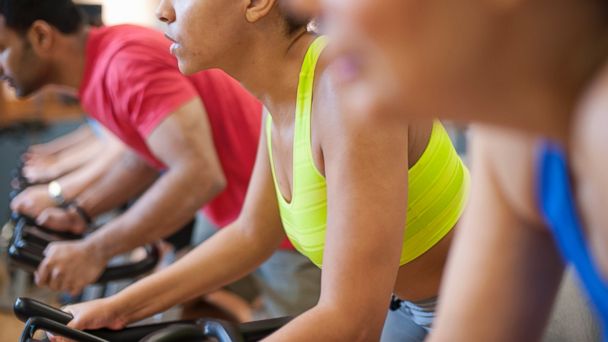
Getty Images
The powers of a steady fitness routine are impressive: regular exercise can help you build stronger muscles, stave off chronic illnesses, and make your clothes fit a whole lot better. But there's another benefit of physical activity that deserves a shout-out: the way even moderate amounts seem to shave years off your age, no matter how many birthdays you've actually celebrated. Of course, you can't change your chronological age, but exercise can improve your health to the point where you look and feel younger than you are, says Frank Frisch, PhD, director of kinesiology at Chapman University in Orange, Calif. Behold the physical and mental effects a sweat session can have on your brain and body. Just reading this list will motivate you to never blow off a gym session again.
| Exercise gives you more vim and vigor |
A workout is like nature's energy drink, firing up your brain and body so you feel more alert and alive. "Exercise puts your body in a state of arousal, which translates into more vitality and a greater sense of well being," says Frisch. "Daily tasks become less strenuous and require less exertion." It's the kind of pep in your step that makes you feel like you've peeled off a decade or two.
| Exercise jumpstarts your sex drive |
A sweat session improves blood flow all over your body, including below the belt, and the extra blood surge makes you feel more responsive and increasing arousal, says Mary Jane Minkin, MD, clinical professor of obstetrics and gynecology at Yale School of Medicine. Exercise also powers your sex drive in a psychological way. "Working out brings on more confidence about your appearance and body, and that puts you in a sexier mindset," says Dr. Minkin. And don't forget the all-over energy surge exercise offers, which gives you extra fuel so you can rock the sheets.
| Exercise keeps your skin soft and glowing |
A dewy sheen on your cheeks thanks to all the sweat dripping off your forehead may not be the only way fitness keeps your skin young. Researchers at McMaster University in Ontario studied a small group of adults between ages 20 and 84. The frequent exercisers who were over age 40 had skin that resembled the more supple, elastic skin of people in their 20s and 30s. The difference had nothing to do with sun exposure (which would age your skin faster if you didn't wear sunscreen), reported the research team; they theorized that exercise creates body substances that help slow aging in skin, though they say more research is needed to learn how exercise changes skin composition.
| Exercise improves your posture |
Thanks to muscle loss and bone density changes, your posture takes a hit as you age. Counteract this with strength training, which builds muscle and bone health, especially in your core and along your spine, so you naturally stand taller and shave years off your appearance, says Amie Hoff, personal trainer and founder of Hoff Fitness in New York City. Working out also makes you feel more psychologically powerful, so you naturally stop slouching and straighten up, she adds.
| Exercise improves your flexibility |
Aging doesn't just make your opinions more inflexible—it makes your muscles and joints more fixed in place as well, leaving you feeling stiff and rickety. Regular workouts, especially stretching-oriented routines such as yoga and Pilates, keep you loose and bendy, says Hoff. "If cardio workouts are your preference, you can still boost your flexibility by warming up and cooling down with foam roller exercises," she suggests. This foam fitness tool gets rid of the knots that form in muscle, reducing rigidity.
| Exercise boosts your mood |
You've heard of runner's high, and that blissful mood boost can happen during any sweat-inducing cardio workout. It seems to come down to endorphins: the body chemicals your system cranks out when you're active. "Endorphins are like natural opiates," says Eric Sternlicht, PhD, associate professor of kinesiology at Chapman University. Some evidence shows that gym sessions can trigger changes in other neurotransmitters linked to pleasurable feelings, such as dopamine. And the confidence kick you get helps you feel happier too.
| Exercise helps you sleep soundly |
Restful sleep is like a fountain of youth, and exercise helps you achieve it. "Research shows that regular exercisers fall asleep more easily and are more likely to experience deep REM sleep," says Frisch. A heart-pumping workout tires you out, sure, but there's more to it than that. Sleeping well helps all the systems in your body function optimally, so you're less likely to feel stressed and then toss and turn all night. A recent study bears this out, finding that getting at least 150 minutes of exercise per week improved sleep quality by 65%.

No comments:
Post a Comment